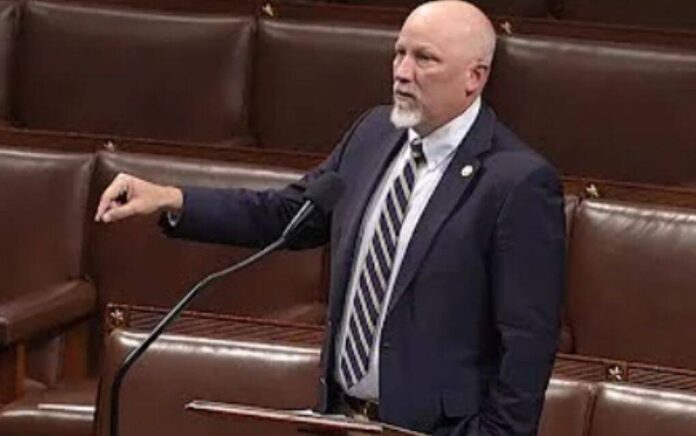
Most Americans are tired of illegal immigration. President Trump can only do so much himself.
That’s why a top U.S. Congressman has introduced a bill to put an end to this insane amnesty loophole.
Texas Lawmaker Targets Amnesty Loophole with Bold Legislation
Texas GOP Representative Chip Roy has introduced legislation aimed at dismantling a long-standing executive authority that has shielded thousands of foreign nationals, including illegal migrants, from deportation for over three decades. The “End DED Act,” as Roy calls it, seeks to close a loophole that has allowed presidents to bypass Congress and grant temporary stays of removal under Deferred Enforced Departure (DED). This program, Roy argues, has been a tool for unchecked executive overreach, undermining the rule of law and America’s immigration system.
The legislation, obtained by the Daily Caller News Foundation, would prohibit the use of taxpayer funds to enforce DED, effectively stripping the program of its operational power. By cutting off federal funding, Roy’s bill aims to restore Congressional authority over immigration policy, a priority for the incoming Trump administration and its GOP allies, who have vowed to tackle border security with renewed vigor.
“Deferred Enforced Departure (DED) is a fabrication of the executive branch that allows the president to shield foreign nationals, including illegal aliens, from deportation based on vague ‘foreign relations power,’” Roy said in a statement to the DCNF. “DED has no statutory basis.” His words add to the frustration among conservative lawmakers who see DED as an unconstitutional workaround that circumvents the legislative process and enables presidents to enact de facto amnesty without accountability.
Introduced in 1990 during the George H.W. Bush administration, DED allows presidents to grant temporary protection from deportation and work authorization to foreign nationals, often from countries facing turmoil like armed conflicts or natural disasters. While similar to Temporary Protected Status (TPS), which is administered by the Department of Homeland Security and carries statutory weight, DED stems solely from the president’s constitutional authority over foreign relations, making it a uniquely unchecked power. Roy’s legislation seeks to end this practice, which he and his supporters argue has been abused to the detriment of American taxpayers and legal immigrants.
“It bypassed Congress’ jurisdiction over immigration policymaking, such as determining which immigration programs should be deliberated and passed into law and to what extent they should be utilized,” the Texas lawmaker continued. “It’s long past time for Congress to reassert its role in regulating immigration by ending a program that enables illegal aliens to stay in the U.S. with work permits through the executive.” Roy’s stance aligns with the Trump administration’s commitment to prioritizing American citizens and closing loopholes that have long been exploited.
The urgency of Roy’s proposal comes into sharp focus when examining recent uses of DED. Critics point to former President Joe Biden’s administration, which issued DED designations to certain groups during its final days, as part of a pattern of expansive amnesty policies. These actions, opponents argue, exacerbated the border crisis by encouraging illegal migration and straining public resources. Even President Donald Trump, while generally tough on immigration, used DED authority for specific migrant groups, highlighting the program’s entrenched role in executive decision-making.
Immigration hawks have rallied behind Roy’s bill, seeing it as a critical step toward reining in what they describe as rampant abuse of executive power. “As the bill notes, DED was invented during the George H.W. Bush administration with no statutory authority,” said Ira Mehlman, a spokesman for the Federation for American Immigration Reform (FAIR), in a statement to the DCNF. “Like every other dubious claim of discretionary authority, it was abused by the Biden administration to allow members of certain nationality groups to remain in the U.S. indefinitely with work authorization.”
Mehlman pointed to specific examples of DED’s misuse under Biden, noting, “During his final year in office, President Biden granted DED to Lebanese and Palestinians without the ability to reliably identify individuals who may have ties to terrorist organizations.” Such actions, critics argue, not only undermine national security but also send a message that illegal immigration will be rewarded with legal protections and work permits. FAIR’s endorsement of Roy’s legislation reflects a growing consensus among conservative groups that DED must be eliminated to restore order to the immigration system.
The coalition supporting the “End DED Act” extends beyond FAIR, with groups like the Immigration Accountability Project, Center for Renewing America, National Immigration Center for Enforcement, and Heritage Action throwing their weight behind the bill. These organizations view the legislation as a cornerstone of the effort to secure the border and ensure that immigration policies serve the interests of American citizens. The Trump administration’s return to power has emboldened these groups, who see an opportunity to dismantle decades of permissive immigration policies.
Roy’s bill arrives at a pivotal moment, as the incoming Trump administration has made border security and immigration enforcement central to its agenda. GOP allies in Congress are aligning with the president-elect’s vision, pushing for reforms that prioritize legal immigration and deter illegal crossings. By targeting DED, Roy is addressing a program that critics say has been a backdoor for amnesty, allowing foreign nationals to remain in the U.S. under the guise of humanitarian protection while sidestepping Congressional oversight.
The “End DED Act” represents a bold challenge to the status quo, aiming to reassert Congress’s constitutional role in shaping immigration policy. For too long, critics argue, executive actions like DED have eroded the checks and balances designed to ensure democratic accountability. With the support of influential conservative groups and the momentum of a pro-border security administration, Roy’s legislation could mark a turning point in the fight against illegal immigration.
For Roy and his allies, the “End DED Act” is not just about defunding a single program—it’s about sending a clear message that the era of unchecked executive power and lax border policies is coming to an end.
Continue to read breaking updates on immigration coming out of Washington, D.C. right here on The Federalist Wire.



















